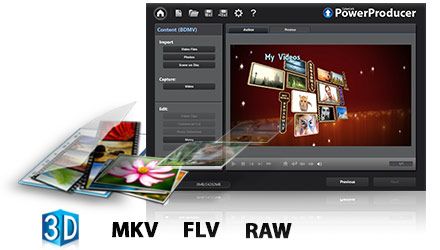
CyberLink PowerProducer 6 adds animated menu templates, widens file format support
CyberLink has released PowerProducer 6 Ultra, the latest version of its DVD authoring tool, and while the changes aren’t revolutionary there’s plenty to explore.
The program now includes 14 animated 3D-like menu templates, for instance. Some aren’t so great, but others are very good indeed, and on balance they’re an excellent extension to the program’s abilities.

Microsoft's Android bashing campaign goes down in flames as #WindowsRage trends
What was Microsoft thinking? The software giant initiated a campaign on Twitter, dubbed #DroidRage, inviting Android users to share their "malware horror stories", only to have it backfire spectacularly shortly afterwards. A huge number of anti-Microsoft posts with the #WindowsRage hashtag appeared on Twitter and Google+, almost immediately.
The problem with the campaign, apart from the less-than-brilliant concept, is the timing. Criticism of Microsoft’s more recent products, such as Windows 8, Surface and Windows Phone 8, should have caused the company to lay low for a while. Instead, the firm unwittingly gave frustrated users of its new products a unified hashtag to rally behind.
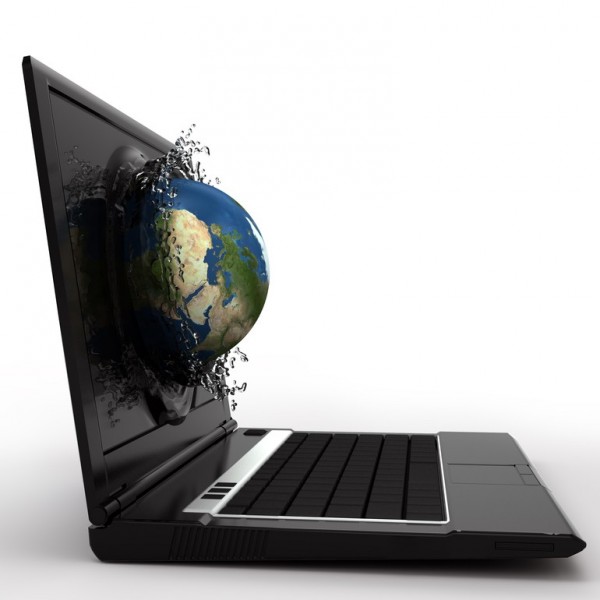
Internet Explorer 10 Release Preview for Windows 7 first-impressions review
When Microsoft first announced that Internet Explorer 10 would be part of Windows 8 most users assumed that this would also mean a release of the browser for the version 7 operating system. The first version of Internet Explorer 10 was released publicly with Windows 8's Developer Preview back in 2011, and then updated whenever new versions of preview builds released. Microsoft at that time was tight lipped about the future of IE10 for Windows 7
October 2012 came and brought along Windows 8's launch. It was in the week prior to the release of Windows 8 that the company shed some light on the future of IE10 for Windows 7. A blog post indicated that Microsoft had plans to release a preview version for Windows 7 in November 2012.

Internet Explorer 10 Release Preview is available for Windows 7 -- get it NOW!
Microsoft has announced the availability of Internet Explorer 10 as a Release Preview edition, in both 32-bit and 64-bit flavors, for Windows 7. (And yes, only Windows 7 users with SP1 installed need apply. Windows Vista and XP are left out of this one.) Changes are mostly under the hood, but the upgrade does deliver some major performance improvements which you may like to try.
In our first tests, the new Release Preview installed much like any other Windows update. It downloads a few files, and whirs for a while before demanding a reboot. Which takes a little longer than usual as various core files are replaced.

Google releases Chrome Remote Desktop -- get it NOW!
One year after launching Chrome Remote Desktop in beta form, Google today announced that the Chrome browser app is now available as a stable release. What features can users expect?
Using the "Remote Assistance" feature from Chrome Remote Desktop, users can connect to other computers to offer or receive assistance. The set up is fairly straightforward and it involves typing in a Chrome generated code to gain or provide access to one's computer. For those that want to access their own computer via remote control, "My Computers" let them do just that using solely a PIN number after activating the feature.

Windows is doomed
Napier & Son was the most successful British manufacturer of aircraft engines in the 1920s and 30s with their 12-cylinder Napier Lion powering 163 different types of aircraft between 1918 and 1935. Over that 17 year period the Lion grew from 450 to 1350 horsepower and was, for awhile, the most powerful aircraft, boat and car engine in the world, holding world speed records in all three venues at the same time. And then the Napier Lion was suddenly gone -- a lesson from which Microsoft CEO Steve Ballmer could benefit if he and his company don’t repeat it.
Napier perfected the Lion engine over those 17 years, improving it in every way until it was the best and most efficient engine of its class in the world. Then, seemingly overnight, the class changed as air forces and record setters alike suddenly needed more than the 1,350 horsepower a finely-tuned Lion could deliver. Napier’s Lion gave way to Rolls-Royce’s larger and innately more powerful Merlin and Griffon engines and Napier, for all intents and purposes, was gone.
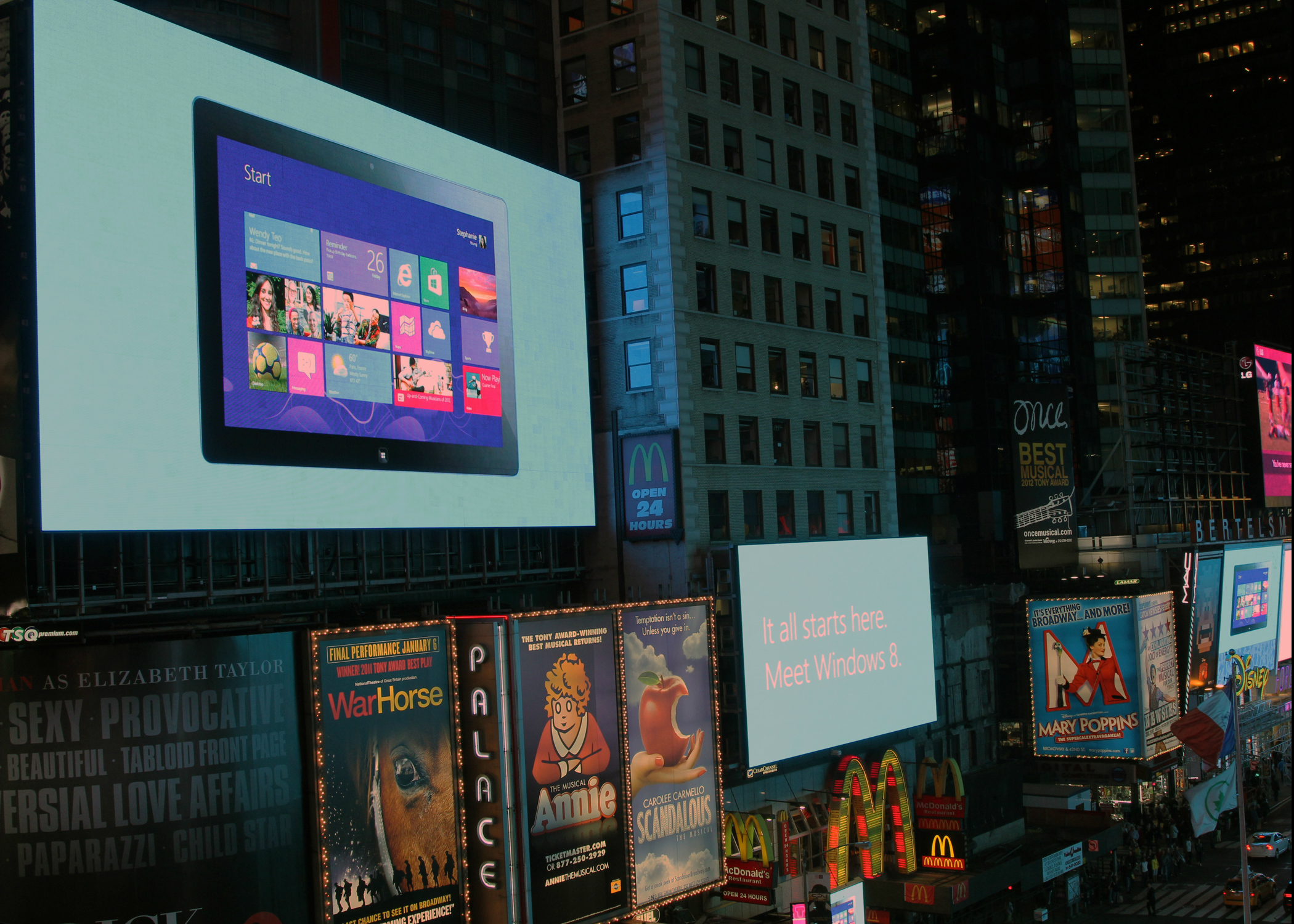
Today is Windows 8 day across the globe, and it's a different world for Windows
The disused Pier 57 pavilion in New York City's Meatpacking District served as a fitting backdrop for Microsoft's Windows 8 launch party yesterday. The ramshackle warehouse is currently only used as a location for big monthly events, and not for any daily purpose. The big blocks of color, and simple, attractive Windows 8 logos stood in stark contrast to the rough building itself. It was easy to see the entire event as a metaphor for the current state of the personal computer industry.
The entire PC market has been in decline across the board, and Windows revenue has fallen for the last two years according to three leading market research firms IHS iSuppli, Gartner, and IDC. Despite the unquestionable popularity of mobile devices, the PC is hardly less relevant or less valuable than it was. The more pressing problem has been the difficulty individuals and businesses have in justifying the purchase of a new machine in such low economic times.

Dell prices Latitude 10 and XPS 10 tablets
Little more than a month ago Dell introduced the Latitude 10, a Windows 8-based tablet aimed at business users, but withheld the price. Two days ahead of the Windows 8 October 26 launch, the US company slapped a price-tag on its XPS 10 and Latitude 10 tablets.
Unlike the Latitude 10, that runs Windows 8, the Dell XPS 10 is aimed at consumers and will ship with the ARM-compatible Windows RT, similar to Microsoft Surface.
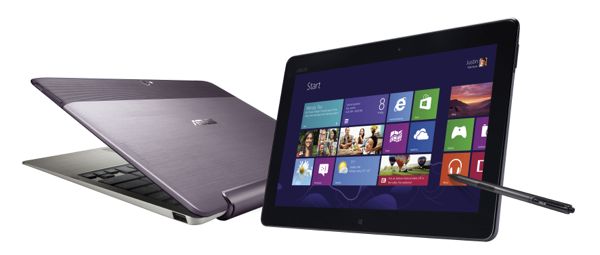
ASUS prices VivoTab Windows RT tablet
The ASUS Windows 8 tablet roadmap leaked little more than a month ago, giving pundits reason to speculate on whether the rumored pricing would hinder the success of the Windows 8-based devices.
The Taiwanese company has officially announced pricing for its VivoTab RT (Windows RT-powered) tablet and put previous pricing rumors to rest.
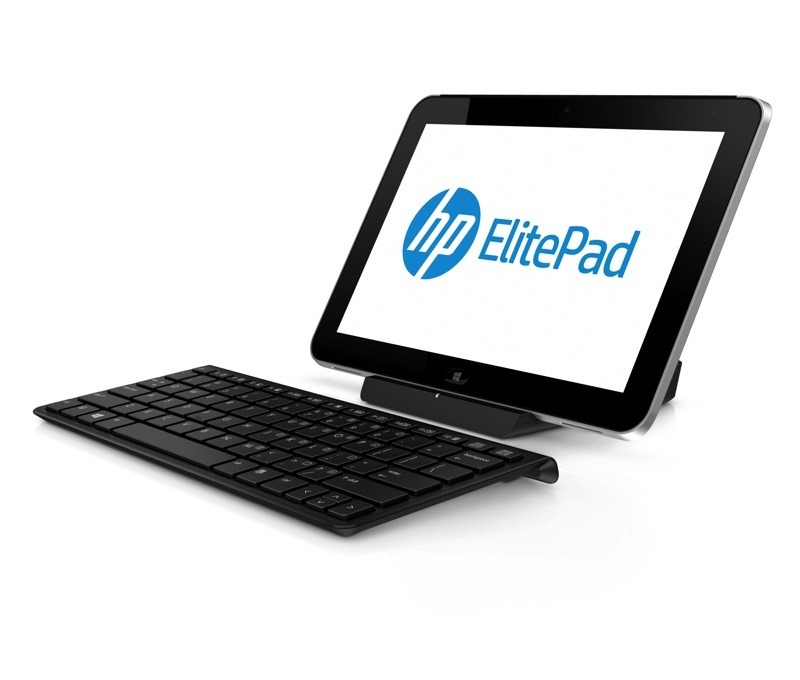
HP prices new PC lineup ahead of Windows 8 launch
Microsoft launches Windows 8 in just two days, and manufacturers such as HP are putting all their cards on the table, and announcing pricing for their Windows 8 lineups.
Even though there were models introduced long before today, HP chose to keep quiet about their pricing. But after Microsoft priced its Surface tablet, the company has finally announced that its similarly-sized Envy x2 sporting an 11.6-inch display and the Intel Atom Z2760 processor will be priced starting at $849.99. One of the most recently introduced devices with attractive accessories, the business-oriented ElitePad 900 running the same type of processor bearing the "Clover Trail" code-name, is still a no-show in terms of pricing, and instead will be announced closer to its availability.
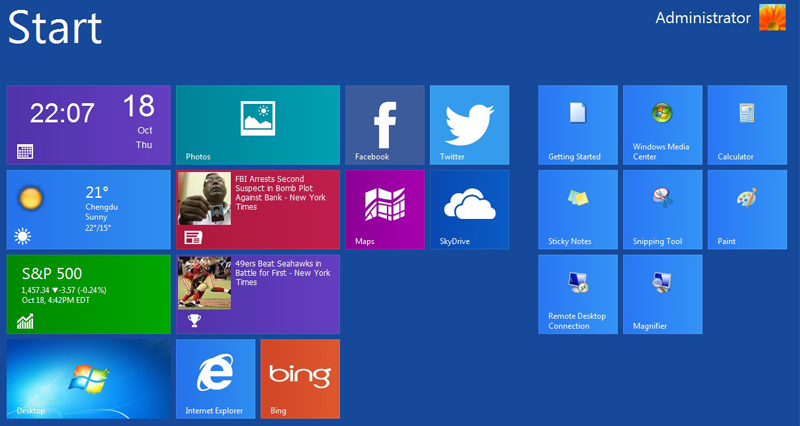
Use WinMetro to bring Modern UI to older Windows
Microsoft may have changed the name of the interface formerly known as Metro to Modern Interface, but that does little, if anything, to stop consumers and software publisher from continuing to use the original moniker. As such, one of the apps that brings the look of Windows 8 to older versions bears the name WinMetro.
Regardless of the technical appropriateness of the name, WinMetro is a handy utility for anyone impressed with the aesthetics of Windows 8 but who is not looking to make the jump from the current operating system. While the tool is not a replacement for the Start menu in the strictest sense of the word -- it is not possible to remap the Windows key to bring it into view for instance --- the application is a neat overlay that brings you the look and feel of Windows 8 at no cost.

Microsoft Q1 2013 by the numbers: $16.1B revenue, 53 cents EPS
Eight days before Windows 8's big launch, Microsoft served up expected, dismal news about its successor, in the wake of disastrous third-quarter PC shipments. They sapped Windows division revenue and profit, keeping to a recent trend. There was never a question of negative impact, merely how bad -- as Wall Street analysts expected overall company revenues to decline. The question everyone should ask: Can Q4 be any better than this?
For fiscal first quarter 2013, ended September 30, Microsoft revenue fell 8 percent to $16.1 billion, year over year. Operating income: $5.31 billion, down 26 percent. Net income: $4.47 billion. Earning per share fell 22 percent to 53 cents. The results are impacted by a $1.36 billion, or 13 cents-a-share, deferral related to Windows 8 and Office 2013 launches.

Developers give Internet Explorer 10 for Windows 7 Preview cold reception
Whoa, and I thought BetaNews commenters were a rowdy lot. Today, Microsoft announced that Internet Explorer 10 would come to Windows 7 next month as a "preview". I would think that would be welcome news, but not to cranky complainers at Microsoft's IE blog.
"We will release a preview of IE10 on Windows 7 in mid-November, with final availability to follow as we collect developer and customer feedback", Rob Mauceri, IE group program manager, posts. "We look forward to getting your feedback on IE10 on Windows 7, and will provide another update when the preview is available".
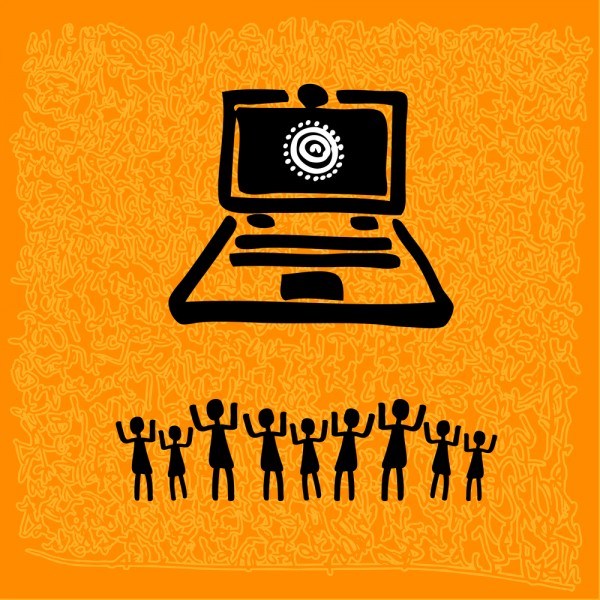
Tech tribalism leads to BAD computing decisions
Computing, and I use the term in the widest sense, has always been tribal to an extent. People have loyalties, and there’s nothing wrong with that. This year, tribes are called "ecosystems", but whatever the current label, looking around the Interweb it seems to me that tribalism is becoming more prevalent and more aggressive. It’s as if everyone stood on soapboxes with their fingers in their ears, shouting "LALALALALALALA", while at the same time (a good trick, this) yelling through a megaphone that theirs is the only way and anyone who doesn’t agree is just too stupid to be considered human.
Famously, way back in 1994, the writer and thinker Umberto Eco (The Name of the Rose) compared computing loyalties to religions: Apple followers were Catholics who believed that they would find salvation through following the One True Path. Conversely, PC users, like Protestants, were obliged to find their own way through the many paths open to them, and not all would be saved. And (I guess) Linux users are the hairy prophets who come out of the desert proclaiming, "It’s really easy. Honestly. And these days you only have to scourge yourself with thorns once a week …"

Apple is the new leader in technical stagnation
The golden years of Apple's outright dominance in technical innovation is fading, and quickly at that. The iPhone 5 just launched with a deservedly ho-hum and lackluster reception, with many people asking the obvious question: that's it? For a company riding the high waves of Wall Street for more than a few years now, with earnings going through the roof quarter upon quarter, is this the best that a larger-than-life tech giant can bring us?
Maybe the naysayers are right in that Apple is the leftover shell of a monolith once passed (post-Jobs.) Perhaps that internal drive to bring out the best in technology they release is starting to fizzle. I'd go as far as to argue that Apple never really has been as continually innovative as many people may believe. While Apple does have an easy ability in commanding the lead for sectors it enters, this doesn't necessarily mean the company if filled with technical Einsteins as so many supporters clamor to believe.
